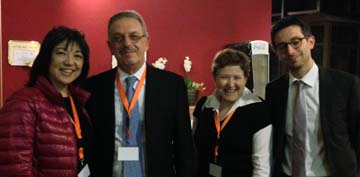Global trade news
New Zealand pushes 'toddler milks'
The Codex Alimentarius Commission is a UN (WHO/FAO) body that sets global food standards for the composition, quality, safety and labelling of food products. It is an extremely important body that has relevance for many international campaigns. However, few people know of its existence or understand what it does or how it works. One thing is certain, the food industry never ignores Codex and dominates its meetings - eager to legitimize its processed foods and keep the system as unregulated and voluntary as possible. Now that the World Trade Organisation is mandated to refer to Codex Standards in trade disputes, countries may face challenges if they propose legislation that is more restrictive. We have attended Codex meetings since 1995, to ensure that World Health Assembly safeguards are not forgotten.

Above: Dr Chizuru Nishida, WHO, Basil Mathioudakis, European Commission. Dr Janet Albert, Food and Agriculture Organisation and Francesco-Felice Carlucci , European Commision.
 There were several important discussions relating to infant and young child feeding this year and IBFAN's position is supported by many developing countries. In July, African nations called for the prohibition of ingredients that may be unfit for human consumption such as cotton seed oil and GM ingredients. The producer nations succeeded in rejecting this call, insisting that 'it was up to each country to decide.'
There were several important discussions relating to infant and young child feeding this year and IBFAN's position is supported by many developing countries. In July, African nations called for the prohibition of ingredients that may be unfit for human consumption such as cotton seed oil and GM ingredients. The producer nations succeeded in rejecting this call, insisting that 'it was up to each country to decide.'
Left: Louis Vareille, Global Affairs Director of Danone and Robert DiGregorio, Nestlé Nutrition, ISDI at the IBFAN's briefing for Member States.
In November, New Zealand, a major formula exporter, led the call for a new standard for formulas for older babies. The German Secretariat, using German privacy laws, had forbidden recording and, in the report writing stage, New Zealand claimed not to recall WHO saying that a new standard was not necessary.






